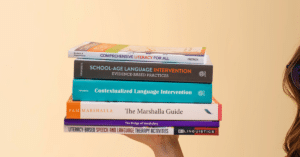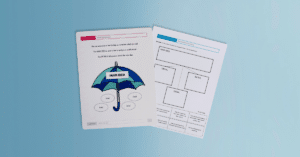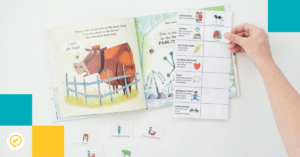Listen on Apple Podcasts Listen on Spotify
This Week’s Episode: What We’ve Learned About Phonological Awareness
Today we will wrap up our Phonological Awareness series with a quick review of all that we’ve learned. So far in this series, we’ve done a quick review of phonological awareness and why is it is so important. We shared phonological assessment resources and phonological awareness goal examples. And last week Monica shared some of her favorite treatment ideas and examples on how to use them in the therapy room.
We are excited for you to take all that we’ve learned and start embedding the practice into your therapy! Let us know what worked and what didn’t. We love to hear from you!
Let’s get to it!
Phonological Awareness Review
– Phonological awareness is your ability to “identify and manipulate units of oral language: words, syllables, onsets (beginning sound c in cat) & rimes (end sounds -at in cat)”.
– Phonological and Phonemic Awareness
– Free Phonological Awareness Assessment: The PAST Test Screener: David A. Kilpatrickby + Two Peas In A Pod (TPT): Free PA Assessment
– Phonological Activities: University of Florida Literacy Institute (Multi-Sensory) + Phonemic awareness activities: from Children’s Learning Insitute at University of Texas (UT)
– Goal Examples:
When given a CVC word orally as a prompt and asked to identify which position a particular sound (initial. medial, final) in the word is in (example: “Say the word tap. What is the medial sound in “tap”?”), STUDENT will identify the sound being requested for each prompt with 80% accuracy in 2 out of 2 trials as measured by teacher-made assessment.
When given the onset and rime (/b/ + /at/ , /h/+/ot/) for 10 different 3-letter short vowel words (CVC words), STUDENT will blend those sounds (onset and rimes) into words with 100% accuracy in 2 out of 2 trials as measured by teacher-made assessment.
–When given 3 phonemes as a prompt (example: /c/ /a/ /t/ or /p/ /i/ /g/), STUDENT will orally blend those phonemes into words with 80% accuracy in 2 out of 2 consecutive trials as measured by teacher made assessments.
Links Mentioned and Additional Research
– Kelly Farquharson, PhD, CCC-SLP Instagram: @classlab_fsu
– ASHA Evidence Map: Systematic Review: Effectiveness of Early Phonological Awareness Interventions for Students with Speech or Language Impairments
– ASHA Evidence Map: Early Childhood Education Interventions for Children With Disabilities Intervention Report: Phonological Awareness Training
–Article: Al Otaiba, S., Puranik, C., et al. (2009). Across the eight studies investigating the effects of phonological awareness training in students with speech impairments, all studies indicated improvement of the trained phonological skills.
– Ukrainetz Pearson EBP brief
–EBP brief on phonemic awareness efficacy
–Do Phonemic Awareness Interventions Improve Speech in Preschool Children with Speech Sound Disorders?
– Cabbage Et al article (Decision Tree + Sample Assessment Checklist)
– Test for multisyllabic words! Can they blend them together?
– “Hesketh (2009) says, “My intervention principle is to incorporate PA-type activities in support of speech change using stimuli relevant to the child’s target processes, syllable structures, contrasts or sounds, rather than seeing PA skills as a target in their own right. A typical intervention session will involve the child in listening to, thinking about and producing sounds but the balance between these three elements varies enormously across children and across sessions.”
–Gillion, 2000:
Compared traditional articulation to phonological awareness intervention (check out the article for the full details, but we’ll share some of the activities today). The children who received phonological awareness intervention made significantly more gains in their phonological awareness ability and reading development than the children receiving the other types of speech and language intervention. The phonological awareness intervention also improved the children’s speech articulation.
Subscribe & Review in iTunes
Are you subscribed to the podcast? If you’re not, subscribe today to get the latest episodes sent directly to you! Click here to make your listening experience auto-magic and as easy as possible.
Bonus points if you leave us a review over on iTunes → Those reviews help other SLPs find the podcast, and I love reading your feedback! Just click here to review, select “Ratings and Reviews,” “Write a Review,” and let me know what your favorite part of the podcast is.
Thanks so much!
Transcript
Marisha: Hello there and welcome to the SLP Now podcast, where we share practical therapy tips and ideas for busy speech-language pathologists. Grab your favorite beverage and sit back as we dive into this week's episode. Hey there SLP, this month, Monica and I are diving into all things phonological awareness. So in episode 98, we did a quick review of what phonological awareness is. And we're going to spend the rest of the month talking about assessment, goals, treatment ideas, all sorts of good stuff. So, without further ado, let's dive into this week's episode. Now, let's wrap it all up. So what are some last thoughts or things that you think SLPs should be thinking about or considering when they're implementing this?
Monica: I think probably one area of caution would be with students who have apraxia, just to be really cognizant that you don't want to be doing these phonological awareness things if you're doing that practice. Because it involves a lot of segmenting the sounds and you're teaching a motor plan. Just to be very intentional about your teaching and bringing phonological awareness. Then from where you're really practicing those sounds and to make sure the student knows... This is not the way that we're saying it, we're just working on being able to hear these sounds, being able to rhyme them, or whatever it is. Because it's still important to practice with that population, but just to be kind of intentional about that practice part.
Monica: I think also to know that this isn't a magic wand situation. Just because we work on phonological awareness that they're not necessarily going to be a successful reader. This is not just for us, this is for the classroom as well, and everyone who's working on it. That it's going to help them improve those skills, but maybe if you're talking to parents that... We still might expect that they have some difficulty later on, but that it's definitely going to help with future spoken language impairments and reading. And, of course, all of those things that are related... Writing, spelling, comprehension, kind of all of those things. So that's, I think, important to note. There's no like end to that. No, it's not like a speech sound disorder where you do that and then they're dismissed from it. It might be something that's kind of ongoing. That's where the literacy supports come in, too. The people who have done a lot more professional development and who really specialize in that... There's tons of different approaches out there.
Marisha: Awesome. Any other tips or words of advice or anything we need to consider?
Monica: No, I don't think so. I think that it's just, in the end, there's that little bit of assessment piece that you can add on that wouldn't take very long. It might be 10, 15 minutes. And then just incorporating things into your sessions using materials and target [inaudible 00:03:16] that you already use where... It sounds like a lot. It sounds like you're doing a lot more, but I think it really isn't a lot more. But the trade-off for doing this little bit of incorporating, I think, it's such a huge, huge trade-off with being able to be there. And making sure the kids get the right intervention and being able to incorporate the phonological skills with those kids who have speech sound disorders or don't have speech disorders. For all of the kids to get that exposure that are in your groups, the payoff is potentially really big.
Marisha: Yeah, absolutely. And you have a really interesting quote from Hesketh in 2009 about their intervention principle. Can we talk about that a little bit?
Monica: So I'm just going to quote from that article. It says, "My intervention principle is to incorporate phonological awareness type activities in support of speech change using stimuli relevant to the child's target processes, syllable structures, contrast or sounds, rather than seeing phonological skills as a target in their own right. And a typical intervention session will involve the child in listening to, thinking about, and producing sounds, but the balance between these three elements vary enormously across children and across sessions." So I think it just kind of mirrors what we've been talking about. That you're incorporating it into your sessions as you're going along, and its not necessarily its own separate thing. That it's very much so embedded and should be embedded in practice.
Marisha: Yeah, that's super helpful. And that's what we've been talking about. All of that, but I thought that was a really nice way to wrap things up and put it all together. So just a super quick recap of what we've talked about. We've been talking about phonological awareness. Then we're working on identifying and manipulating words, syllables, [inaudible 00:05:22], and rhymes. And underneath that we've got the phonemic awareness. Then we went through all of the different types of activities that fall under phonological awareness, as well. And we talked about tons of really cool research studies that look at how phonological awareness does have a really significant impact on, or it can have a really significant impact on, reading development and just improving those skills. And then super interesting from a speech language perspective is that targeting phonological awareness can also improve speech production, which is super interesting.
Marisha: Also just emphasizing, Dr. [inaudible 00:06:06] does amazing, amazing work, and her Instagram that you shared is so incredibly helpful. But I think this discussion brought up the idea that a lot of our students... We might think of them as speech only, but how often are they really speech only? And I thought this was a really cool way to start thinking about that a little bit more and maybe adding a few tools to our toolbox if we haven't been using those yet. And just considering that when we are fighting through that assessment.
Monica: And I think that's helpful for SLPs that are trained to fight for full assessments for their speech sound kids. Sometimes you'll get a little bit of pushback... Like we don't have time... But it's either you do it now or they struggle years and years later. So I think all of these articles are great to have for everyone out there that's trying to push for that. I know I talk to my friends a lot in other districts. And then also when you're looking for ways to make those improvements faster and get the kids out faster... We're always looking at LRE and being able to work with the classroom teacher and collaborate and be able to get them out sooner.
Marisha: Yeah. If we can support their progress with their speech sounds and help them make more progress there, plus get the added bonus of that boost with the reading, that's pretty awesome. That's a huge win. And I loved how you found different tools that we can use if we don't have that support. If for some reason, the team isn't assessing that phonological awareness, we've got some really cool assessments that we can pull like the [inaudible 00:07:51] test. And then the [inaudible 00:07:53] article has some really cool tools that we can use as well in assessment. The Gillen 2000 article that I mentioned at the very beginning also talks about the treatment procedure. So some really, really awesome resources in the show notes if you're wanting to learn more. We'll put some goals in there too, if you need a recap of that. And I really liked how we were able to go through... If you have a bunch of different treatment strategies and get some really nice examples of what that would look like and how we can implement that into our therapy.
Marisha: So I'm curious, if someone is listening now... There's an SLP who hasn't been incorporating phonological awareness... Let's see if we can think of three things that they could potentially do. Three easy steps and they could choose any one of them to get started. One that I would pick is to check out some of those assessments if your team isn't looking into that. So the next time you get a speech sound referral or a speech only referral, going through that I think that's a really good introduction. Just to get to know, oh, so these are the types of skills that they're looking at. And then just to see how a student does with that. I think that'd be a huge first step and not too hard. It's just downloading and printing a thing and running through it with a student for a few minutes. So what about you, Monica? What would you do? Maybe we can share a quick strategy that they can use in therapy?
Monica: I think the first one I would probably do is identifying the initial and the final sounds. Just because if the students can do that, you're really working on auditory discrimination and then you can shoo them back to get that self-awareness. Like, oh, wait, what was that fun sound? Or what was the final sound? I feel like that is probably going to make the biggest difference out of those. And it's not too far away, probably, from what everyone's used to doing. And then the third one would probably be checking in with the classroom teacher and asking if they'd been struggling on a benchmark test like the DIBELS or with their reading. Just you check in with that and it might be a really super, quick, easy way to get insight on where that student's doing.
Marisha: I love that. That's a great strategy. They can support in getting started, too. Awesome, so many great tips. Thank you, Monica, for breaking that down for us.
Monica: You're so welcome. This has been fun.
Marisha: [inaudible 00:10:35] next time. Thanks for listening to the SLP Now podcast. This podcast is part of a course offered for continuing education through SpeechTherapyPD. So yes, you can earn ASHA CEUs for listening to this podcast. If you enjoyed this episode, please share with your SLP friends and don't forget to subscribe to the podcast to get the latest episodes sent directly to you. See you next time.
Sign up to receive email updates
Enter your name and email address below and I'll send you periodic updates about the podcast.




Reader Interactions